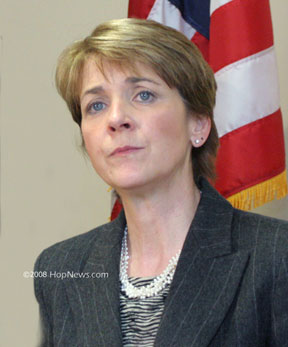| |
 "Um. Expensive." "Um. Expensive."-- Massachusetts Attorney General
Martha Coakley upon being asked at a June 2009 hearing what it would mean for her office if the State legalized gambling.
For those who don't believe casinos generate more crime, take a look at New Jersey - where the Casino Commission requires five divisions, each with a staff:
- The Commissioner's office
- the General Counsel's office
- Administration
- Financial Evaluation
- Licensing
- Compliance
The NJ Attorney General's office requires it's own Division of Gaming Enforcement. And the New Jersey State Police maintains a separate Special Investigation Section which includes a separate unit for
- Casino Investigations
- Special Investigations
- Financial Crimes Investigation
- Casino Services
The reality is that creating a whole new bureaucracy isn't cheap. A brand new government bureaucracy will be necessary to audit, regulate, inspect and oversee casinos - to the tune of $20 million, or higher. Hundreds of government employees will be necessary to ensure compliance with regulations regarding money laundering, wiretapping and loan sharking.
Ka-ching.
In her testimony before a Senate Hearing on June 29, 2009,
Attorney General Martha Coakley presented wide ranging
issues that demand public discussion to ensure transparency and
integrity inherent in consideration of expanded gambling should
the legislature determine to legalize additional forms of gambling
based on claims expanded gambling will generate economic growth, jobs
and revenue for the Commonwealth.
From the Attorney General's Testimony:
Costs and resources
All of these structures, oversight mechanisms, and law enforcement and public health considerations will cost money both in the start-up phase and on an annual maintenance basis. It is crucial to accurately estimate costs of operating a gaming regulatory entity and a licensing regime, and of overseeing gaming operations, investigating and prosecuting gaming violations, and protecting public health. There may be unanticipated cost associated with larger investigations that may require additional funds and personnel, and the gaming commission should be able to charge or assess the unexpected additional costs back to the gaming licensee.
The legislature needs to determine the framework, structure, ethical considerations and compensation for a Regulatory body, such as a Gaming Commission. Of necessity, ethical requirements, as well as staffing and physical office space costs need to be anticipated.
Hackocracy?
Closer to home, it's hardly clear if our far-seeing lawmakers on Beacon Hill have fully explored how to regulate what overnight would become one of the Bay State's largest industries - one awash with cash and temptation.
The danger here is that we could wind up with a good, old fashioned, Massachusetts-style hackocracy, packed with patronage hires who couldn't care less about doing background checks on gambling operators.
Maybe I'm too cynical. But given our state's dubious reputation in such matters, you'll have to convince me otherwise.
In New Jersey's approximately 500 employees in the Attorney General's Office monitor day-to-day
operations on a 24-hour-a-day basis.
Read this letter from a Connecticut Parole Officer,
with 20 years of on the job, who has "been a direct witness" to the additional burden that higher crime rates resulting from the two casinos have placed on the prison system and police services.
A mechanism and structure needs to be established for independent financial audits. The funding source needs to be defined and guaranteed.
Rules regarding clientele require staffing to review and monitor to ensure proper implementation. The funding source needs to be defined and guaranteed.
Pennsylvania regulators, after a supposedly thorough background check, dutifully doled out a gambling license to a local businessman, only to find out he was under investigation for being a little too friendly with local mobsters. Not long after, the Gaming Control Board came under fire for clearing contractors with criminal records to work on projects at various gambling venues.
Topping it all off was an extravagant junket to Rome by board members of the supposed industry watchdog, piling up tens of thousands of dollars at the city's finest hotels, poolside service and all. -- Don't Bring Keystone Kops Routine To MassBanker and Tradesman Magazine, March 1, 2010
Adequate investigatory and enforcement resources must be guaranteed
to assure public confidence.
The legislature must address issues of crime and jurisdiction beyond
the current proposals. Funding needs to be guaranteed.
In Ohio and Dearborn County, crime has escalated to the point that they have had to add an additional court to their county court system, and their jail has now become extremely overcrowded. The statistics that they have provided is that their misdemeanor caseload has grown by 200% since the riverboats came to town, and their felony caseload has tripled. They are also concerned because gambling has brought a dangerous criminal element to their community. The second largest oxycontin dealer in Kentucky is regularly transacting in their casino, and again the issue with children being unattended in the parking lot. They have had an increase in identity theft, counterfeiting, forgery, and fraud cases. They also now have a large massage parlor industry and prostitution has been attracted to the area because of the riverboat gambling. This is of concern as we have pretty much eradicated massage parlor prostitution from our community and I would certainly hate to see the resurgence of that criminal element here in Fort Wayne.
Problem gambling measure pushed
By BRENDAN RILEY - Associated Press Writer
CARSON CITY, Nev. -- A measure that would expand efforts to help problem gamblers has been endorsed by judges, counselors and a Las Vegas lawyer who stole nearly $400,000 from clients to support his gambling addiction.
Douglas Crawford, recently suspended from law practice by the state Supreme Court, told the Assembly Judiciary Committee on Friday that he was "uniquely qualified" to endorse AB102, creating a specialized court for problem gamblers.
The Judiciary Committee also was asked to raise the fees for filing court documents to help pay for nine new district judgeships in Clark County, bringing the total there to 52, and one new judgeship in Washoe County, raising its total to 15.
Jeff Wells, assistant Clark County manager, said that under AB64 nine judges would be added in his county at a cost $28 million. The cost for the Washoe County judgeship would be about $1.2 million. Those who want to fill the new positions would have to run in the 2010 elections.
A companion bill, AB65, calls for a $99 increase in the cost of filing a lawsuit; $1,359 for filing a suit involving business; $349 for a class-action suit and $200 for filing a motion for summary judgment. The fees would be in addition to current fees. The bill also gives county commissions the authority to impose an additional $20 fee for filing a civil suit.
AB64 and AB65 also were endorsed by Chief Justice Jim Hardesty.
Read more...
The Troubling Case of the Revolving Door Effect
The gambling industry has worked diligently to repackage itself as harmless, wholesome entertainment. One key component in this marketing strategy is the portrayal of gambling as a heavily regulated (and thus "clean") industry. However, the often-cozy relationship that exists between the gambling industry and gambling regulatory bodies calls into question the effectiveness of such oversight. In fact, a "revolving door" of sorts exists within the regulatory agencies; many regulators "cash in" on their experience by turning around and working for the industry they formerly regulated.
- August Masciotra was a state racing commission regulator in Nevada and Colorado before he took over as general manager of the Woodlands in Kansas. During his time as general manager, Masciotra and a business partner were charged with stealing more than $25,000 in track funds, although an ongoing investigation has uncovered evidence that over $180,000 were stolen through phony receipts and other fraudulent acts.[1]
- Michael Brown, former director of the New Jersey Division of Gaming Enforcement, later served as the CEO of the Foxwoods casino, reportedly the world's most profitable gambling establishment. Foxwoods has hired other former New Jersey casino regulators, including the past deputy director of gaming enforcement.[2]
- Stephen Perskie, former chair of the New Jersey Casino Control Commission, served as executive vice-president for Players International, a riverboat casino operator.[3]
- Bruce Nourse, former interim director of the Mississippi Gaming Commission, became a senior vice-president for Casino Magic.[4]
- The former chairman of the Louisiana Riverboat Gaming Commission, Ken Pickering, enlisted as a lobbyist for the Riverboat Casino Association of Louisiana.[5]
- Robert Sturges, president of the gaming division for Carnival Hotels and Casinos, formerly served as the New Jersey director of gaming enforcement.[6]
- Former Mississippi Gambling Commission Director Lorenzo Creighton became the general manager of a Vicksburg casino.[7]
- The top administrator of the Illinois Gaming Board is now an executive for a company that manages an Illinois riverboat casino. At least three other former Illinois Gaming Board employees, including the board's former chairman and a former chief legal counsel, have since represented gambling companies with interests in the state.[8]
- The agency which regulates Indian-run casinos in Connecticut has "become a training ground for lucrative jobs with the (Indians') gambling empire," according to the Providence Journal-Bulletin. The agency's executive director, another high-level regulator and the former state police commander have all gone to work for the casino industry.[9]
- Raymond Avansino, who led the worldwide gambling expansion efforts of Hilton Hotels as the corporation's president from 1993 through 1995, previously served for three years on the Nevada Gaming Commission.[10]
- The former director of the Minnesota Gambling Control Board, Thomas Anzelc, later went to work for a company that distributes gambling equipment.[11]
- Mick Lura, former chief administrator for the Iowa State Racing and Gaming Commission, left to become an executive for President Riverboat Casinos.[12]
- Nevada Gaming Control Board Chairman Bill Bible, hailed within the gambling industry as the nation's top regulator, was appointed to serve on the National Gambling Impact Study Commission at the behest of gambling interests. During the appointment process, the Las Vegas press called Bible "the man the (casino) industry desperately wants on the panel."[13]
- Harold Monteau, former chairman of the National Indian Gaming Commission, heads a law office in Washington, D.C., which works for tribes on behalf of various issues, including gambling.[14]
- As executive director of the Illinois Gaming Board, Milton Friedman used his position to link a Nevada casino operator with a state group seeking a casino license. The two parties formed a partnership, which now operates the third-richest gambling boat in the state.[15]
Footnotes
¹Rick Alm, "Former Woodlands Manager, Son-in-Law Charged with Theft of Funds," Kansas City Star, 1/8/03.
²Associated Press, "Ex-N.J. Officials Cashing in with Indian Casino Jobs," (Hackensack, N.J.) Record, August 25, 1993, p. A6.
³Bruce Rubenstein, "Chutes and Ladders," Corporate Legal Times, July 1994, p. 4.
4 Patrick Peterson, "A Wealth of Opportunity for Natives," (Gulfport/Biloxi, Miss.) Sun Herald, April 10, 1997, p. A1.
5 Christopher Cooper, "Bill Eliminating Louisiana Gambling Faces Tough Odds," (New Orleans) Times-Picayune, April 16, 1997, p. A3.
6Mitchell Zuckoff, "Of Carpentry and Casinos," Boston Globe, September 13, 1994, sec. "Economy," p. 37.
7 Associated Press, "Former Gaming Regulator to Run Vicksburg Casino," (Memphis) Commercial Appeal, March 12, 1994, p. 41A.
8 Ken Armstrong and Robert Becker, "Casino Board Seeks to Rein In Ex-Officials," Chicago Tribune, November 12, 1995, sec. "Metro," p. 1.
9 "Roulettes and Revolving Doors," Providence Journal-Bulletin, January 31, 1997, p. 4B.
10Jesus Sanchez, "Hilton President Checks Out After 3 Years," Los Angeles Times, November 22, 1995, p. D2.
11Jim Klobuchar, "Absurdities Spawned by Gambling Have Grown," (Minneapolis) Star Tribune, March 8, 1992, p. 3B.
12Jenny Hykes, "Meskwakis Hire Lura to Head Casino," Des Moines Register, Dec. 28, 1996, sec. "Metro," p. 3.
13Jeff German, "Tark Brings Back Old Times to the Thomas & Mack Center," February 18, 1997, p. 3A.
14"Former Indian Gaming Regulator Heads for Private Practice," Indian Country Today, March 31, 1997.
15David Gosnell, "Odds on Favorite," Belleville (Ill.) News-Democrat, May 11, 1997.
|
|




 "Um. Expensive."
"Um. Expensive."